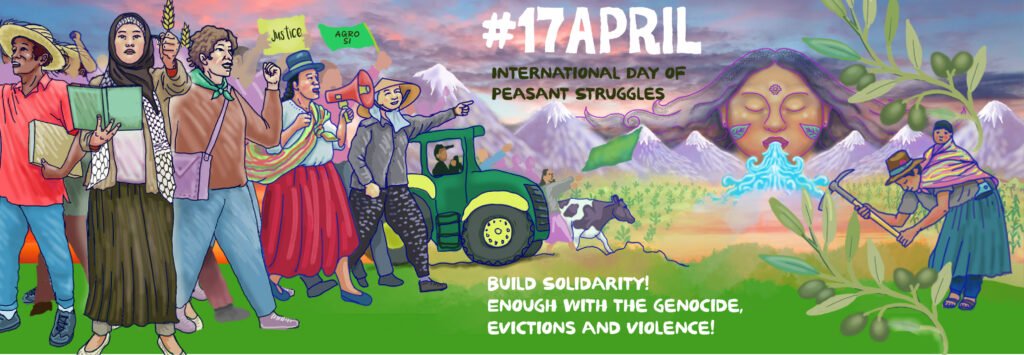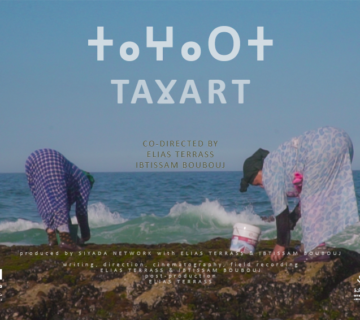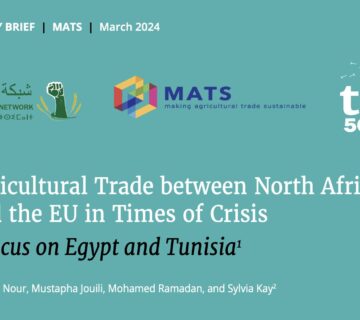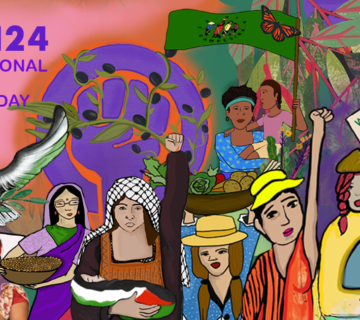17 April 2024 – Today is the International Day of Peasant Struggles. A moment when we, La Via Campesina, commemorate the 28th anniversary of the El Dorado de Carajás Massacre in Brazil and denounce the impunity with which peasant and indigenous people are harassed, attacked and criminalized around the world. Every year, our movement dedicates this day to mobilize in support of the ongoing struggles of peasants, rural communities, indigenous groups, pastoralists, fisherfolk, migrants, and rural workers.
As a global peasant movement, we persistently denounce and resist various forms of oppression—wars, hunger, evictions, persecution, criminalization, and systemic violence—within a geopolitical landscape dominated by the advancing forces of imperialism, neocolonialism, and exploitative capitalism. Our efforts, that also found a full consensus at the recetly concluded 8th International Conference, encompass a diverse set of initiatives, including the UN Working Group to monitor the implementation of the United Nations Declaration on the Rights of Peasants and Other People Working in Rural Areas, the efforts to broaden the global movement for Food Sovereignty by actively contributing towards the Nyéléni Global Forum for Food Sovereignty in 2025, a host of global solidarity campaigns, and our sustained advocacy for an alternative trade framework based on Food Sovereignty. These actions exemplify La Via Campesina’s response to the crisis-ridden context we confront.
On this International Day of Peasant Struggles, our member organizations worldwide are engaged in a myriad of activities. These include demonstrations of denunciation and solidarity, seed exchanges, planting of traditional crops, sale of agroecological products, conferences with other social movements, and various other actions. These efforts nourish global processes and propel collective demands for Food Sovereignty and social justice. Below is a succinct overview of the most notable struggles at the global level.
Neocolonialism’s Grip: Genocides, Wars, Crises, and Starvation Across the Globe
Across various nations, the pernicious effects of neocolonialism are starkly evident. In Palestine, UAWC farmers are urgently calling for a ceasefire amidst the genocide perpetrated by Israel in Gaza, a crime against humanity which has resulted in the loss of over 33,000 lives and has left hundreds of thousands, particularly children and women, in dire conditions of starvation. Actions such as denunciation, sustained solidarity, and humanitarian aid contributions are needed to assist the affected families. Similarly, Sudan grapples with a brutal civil war, supported by imperialist and regional forces, ravages the country with the aim of plundering its resources. This conflict, ignored by the international community, has displaced more than 6 million people, destroyed infrastructure and aggravated famine. Sudanese peasants calls for an end to this foreign intervention to allow the people to determine their destiny and preserve unity.
In Haiti, the country is facing a worsening crisis of hunger and insecurity, akin to a slow genocide. Criminal gangs disrupt food distribution, driving up prices amid fuel shortages. Despite these challenges, peasants bravely supply urban centers, traveling dangerous routes, where they often face robbery, kidnapping and murder. Haitian peasant organizations advocate for a people-driven political transition free from colonial interference. Meanwhile, Cuba, the peasantry strongly denounces the inclusion of the country on the US terrorist list, together with the severe economic blockade, which drastically affects its sovereignty. In the framework of the 65th anniversary of the Agrarian Reform, peasant families and farm workers ask the States to advocate for Cuban rights to national and food sovereignty, which will allow them to continue feeding the population. In Ecuador, the peasantry is struggling against the escalating militarization and breach of international law, particularly highlighting the presence of the Southern Command in South America under the influence of the U.S. government.
Furthermore, rural communities in Niger, Burkina Faso, and Mali, constituting 80% of the population, bear a disproportionate burden of neocolonial sanctions imposed by ECOWAS, the West African Economic and Monetary Union, and the European Union. In response to this threat to the right to food in Sahelian communities, our member organizations are actively engaging in advocacy efforts at the UN, seeking to liberate countries from neocolonial influence.
Assassinations and persecution of those who defend land, territories and life persist
In Argentina, a leader of the peasant organization MOCASE was murdered by an armed gang associated with land usurpation in the northern region of the country. Peasants demand justice and condemn the pervasive violence and frequent evictions inflicted upon them by powerful groups connected to agribusiness. At the same time, peasant farmers in Tanzania are facing repeated arrests and imprisonment for farming on ancestral lands claimed by powerful businessmen. The government’s actions to transfer village lands into block farms for export crops are displacing thousands of farmers and threatening water access. Similar conflicts are erupting nationwide, reminiscent of the failed ProSavana project in Mozambique. Despite challenges, Tanzanian farmers are organizing resistance to defend their lands against corporate agriculture and potential new waves of land grabs. Also in Guatemala, indigenous-peasant organizations condemn ongoing evictions in territories and remain committed to advancing food sovereignty within the country.
Panama‘ s peasant organization persists in its challenge to extractivism in all its forms, especially opposing mining activities. They highlight the crucial role of promoting democracy in the upcoming elections to address the plight of marginalized communities affected by exploitative practices, which has claimed the lives of dozens of indigenous and peasant leaders. Also in France, the draft agrarian orientation law promoted by the government is facing backlash from peasant organizations. Criticized for accelerating a social plan that fuels the disappearance of farmers, the bill is condemned for promoting the concentration of land and resources, disadvantaging the majority.
Meanwhile, in Thailand, our member organization’s battle against the impact of dams, highlighted especially by the adverse effects of the Sirinthorn dam on local communities, underscores the urgent need for fair compensation, sustainable land management practices and environmental justice. In Indonesia, peasants in Kutai Barat, East Borneo and Tanjung Jabung Barat, Jambi are criminalized for mobilizing to defend their land and food production ; this is in a context in which the peasantry is demanding support at the national level for the minimum price of the rice they produce.
Mobilizations continue against public policies that impoverish the peasantry and fuels hunger
Peasant struggles in Sri Lanka persist against national debt and the IMF, with recent victories seen in their campaign against microfinance credit firms. Following sustained advocacy efforts, the government has reversed a proposed amendment. In Bangladesh, BAFLF continues its fight for improved wages for farm laborers on state-owned university farms, while in Pakistan, PKRC grapples with mounting debt and soaring prices. In Nepal, ANPFA intensifies its battle against proposed ‘land banks,’ which it views as a threat to commons and indigenous lands.
On the other hand, Peasant communities in Uganda are struggling with the negative impacts of Large Scale Land Based Investments (LSLBI), which often fail to benefit local areas as promised. Particularly in regions like Northern Uganda, small-scale farmers, especially those in the coffee sector, face challenges engaging with large-scale investors, resulting in marginalization and limited benefits. In Zimbabwe, escalating food prices and currency devaluation worsen food insecurity, affecting millions regionwide. Concurrently, flooding and water scarcity exacerbate the crisis, underscoring the pressing need for sustainable agricultural solutions.
In Belgium and across Europe, farmers are demanding fair prices and incomes, urging an end to negotiations on unfair trade agreements such as the EU-Mercosur deal. While some progress has been achieved, recent EU proposals have been inadequate. With European elections looming, peasants are determined to press for their rights and seek support for agroecological practices and the preservation of peasant seeds. In the same vein, as India gears up for upcoming elections, peasant organizations are intensifying their calls for improved prices and legal assurances regarding minimum support prices. Concurrently, they persist in their resistance against GMOs and advocate against regulatory relaxations for GM maize field trials. In Australia, farmers are denouncing the recent introduction of a Neoliberal policy on exports and biodiversity markets, which threatens to concentrate land ownership, disadvantage small-scale farmers, and potentially lead to the loss of their land due to volatile market conditions.
Agrarian reform gains traction as UNDROP is put into action
In Brazil, peasant communities, inspired by the enduring spirit of the April Red, born 28 years ago after the massacre of Eldorado do Carajás, continue to tirelessly campaign for agrarian reform and food sovereignty. Their steadfast dedication to these causes remains a focal point in ongoing struggles, both regionally and globally. Continuing the struggle, Colombia recently reached a milestone by securing recognition for peasants as rights-holders with special constitutional protection. The movement vigorously advocates for agrarian reform, leveraging the UN-endorsed Peasant Rights Declaration as a political tool. As a further step towards implementing UNDROP for agrarian reform and ensuring equitable access to commons. This country hosted an International Conference on Global Land Grabbing with the participation of an international delegation from La Via Campesina. This event marks one of many actions the movement is taking globally to implement UNDROP in diverse countries and communities.
Standing in solidarity against all violations of human and peasant rights, continuing the struggle against neocolonialism, patriarchy, and capitalism, and unwaveringly committing to agroecological transition for climate justice —these are the core principles driving the food sovereignty global struggle championed by La Via Campesina and its member organizations.
On this International Day of Action of peasant struggles, we unite and raise our voices:
Build Solidarity! Enough with the genocide, evictions and violence!
Find the original statment on the Link




